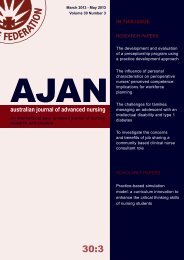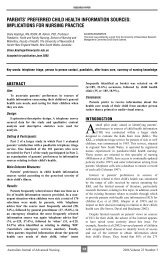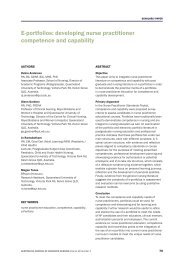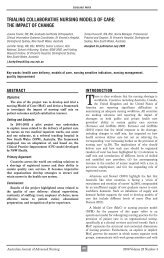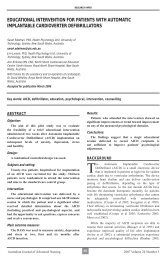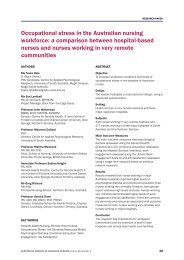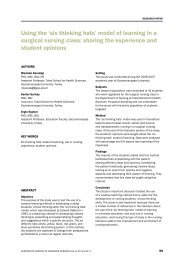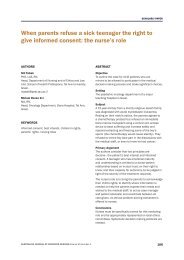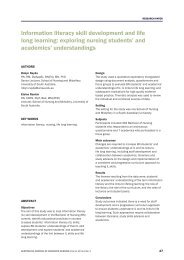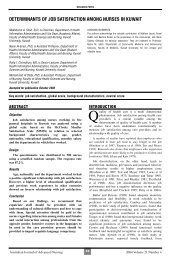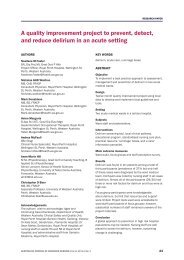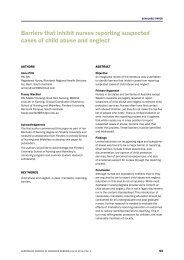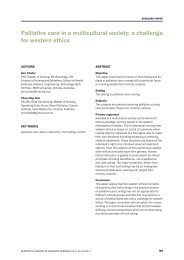australian journal of advanced nursing
australian journal of advanced nursing
australian journal of advanced nursing
You also want an ePaper? Increase the reach of your titles
YUMPU automatically turns print PDFs into web optimized ePapers that Google loves.
RESEARCH PAPER<br />
Living the experience <strong>of</strong> breast cancer treatment:<br />
The younger women‘s perspective<br />
AUTHORS<br />
Elisabeth Coyne<br />
RN, RM, BN, M Nursing (Hons with Distinction)<br />
Lecturer, School <strong>of</strong> Nursing and Midwifery, Griffith<br />
University Logan Campus, Queensland, Australia.<br />
e.coyne@griffith.edu.au<br />
Sally Borbasi<br />
RN, PhD<br />
Pr<strong>of</strong>essor <strong>of</strong> Nursing, School <strong>of</strong> Nursing and Midwifery,<br />
Griffith University Logan Campus, Queensland,<br />
Australia.<br />
s.borbasi@griffith.edu.au<br />
KEY WORDS<br />
young women, breast cancer, qualitative<br />
ABSTRACT<br />
Objective<br />
To explore the experience <strong>of</strong> breast cancer for young<br />
women under fifty years <strong>of</strong> age and describe their<br />
personal experience <strong>of</strong> coping with breast cancer<br />
treatment.<br />
Design<br />
An interpretive qualitative design was used to explore<br />
the experience <strong>of</strong> breast cancer in a young women’s<br />
life. A purposive sample <strong>of</strong> six women completed<br />
in‑depth interviews. A thematic analysis <strong>of</strong> the<br />
transcripts generated several themes relating to their<br />
personal journey through breast cancer treatment.<br />
Setting<br />
The setting for this study was an oncology outpatient’s<br />
setting in a large private hospital in Queensland,<br />
Australia.<br />
Subjects<br />
Six women aged between 28 and 45 years <strong>of</strong> age with<br />
a diagnosis <strong>of</strong> breast cancer in the last 12 months.<br />
Results<br />
Treatment for breast cancer began so quickly following<br />
diagnosis leaving little time to adjust to the concept <strong>of</strong><br />
a life threatening disease. The severity <strong>of</strong> the effects<br />
from treatment influenced the women’s sense <strong>of</strong><br />
person and ability to care for family. Fatigue, nausea<br />
and early onset menopausal changes were particularly<br />
troubling. Women described a positive resolve to<br />
survive.<br />
Conclusions<br />
Treatment concerns for younger women are<br />
qualitatively different from those <strong>of</strong> older women. They<br />
consider they are too young to assume ‘the sick role’<br />
and are not prepared for its sudden onset, neither are<br />
their support networks. The right kind <strong>of</strong> support can<br />
assist younger women and their families to cope during<br />
the early stages <strong>of</strong> diagnosis and intervention.<br />
AUSTRALIAN JOURNAL OF ADVANCED NURSING Volume 26 Number 4 6



